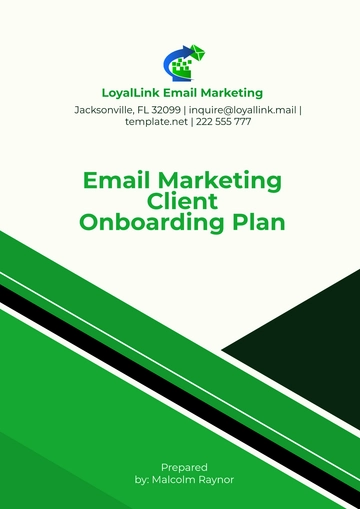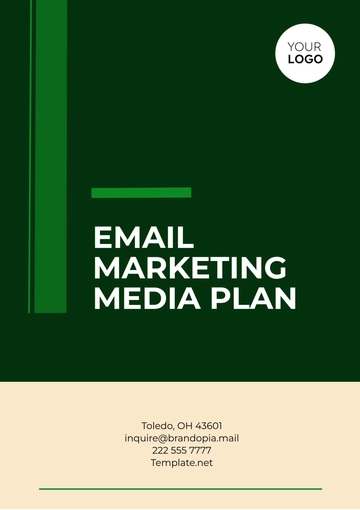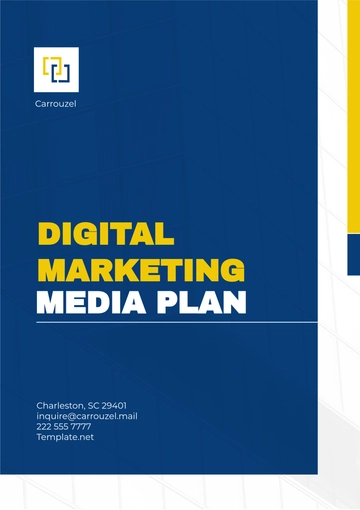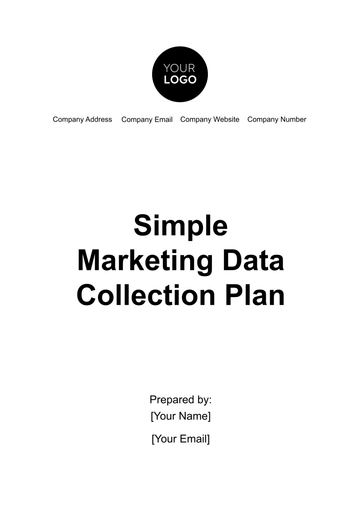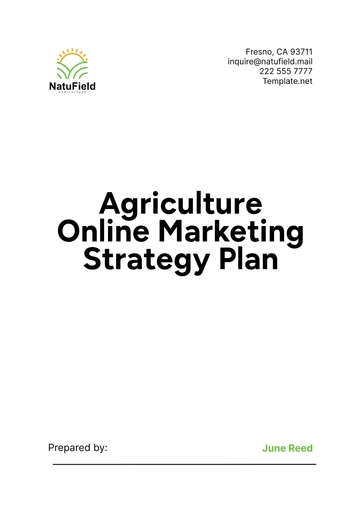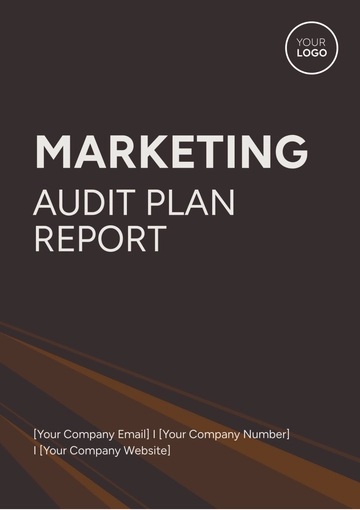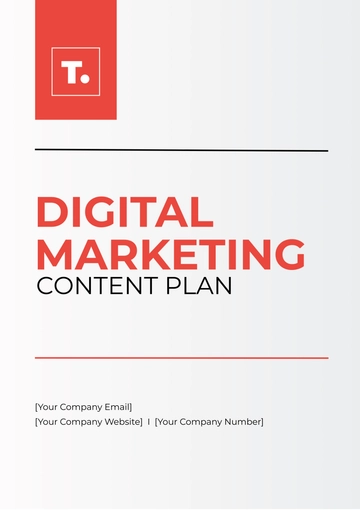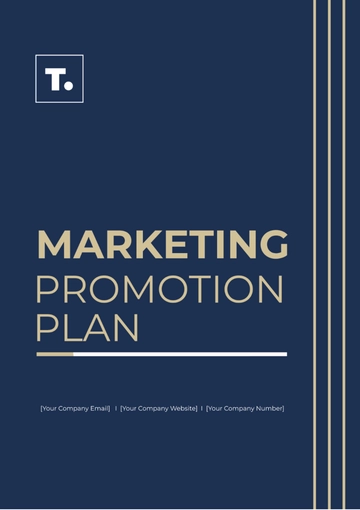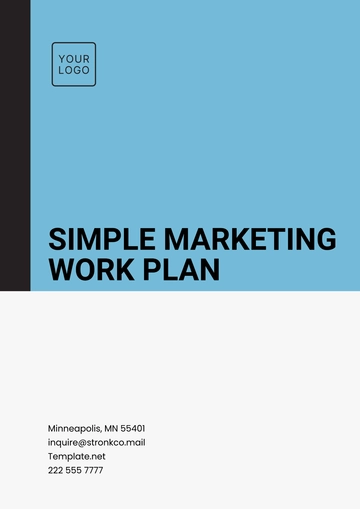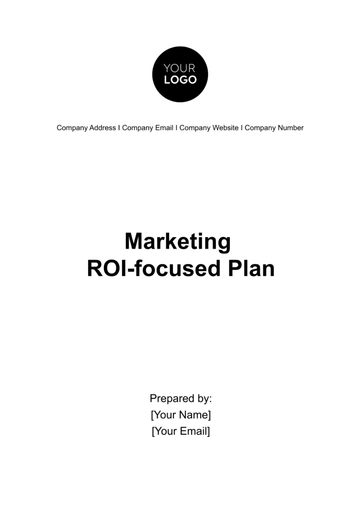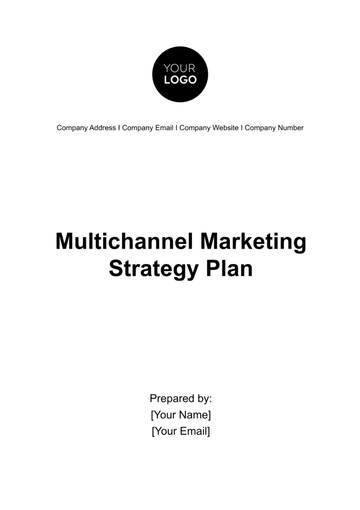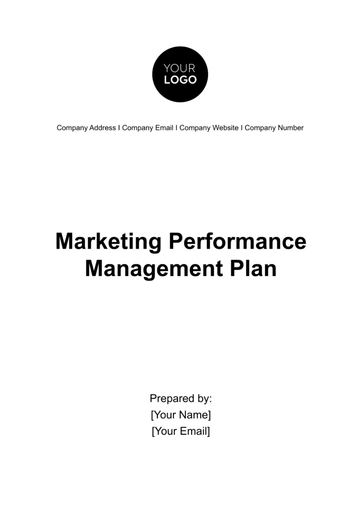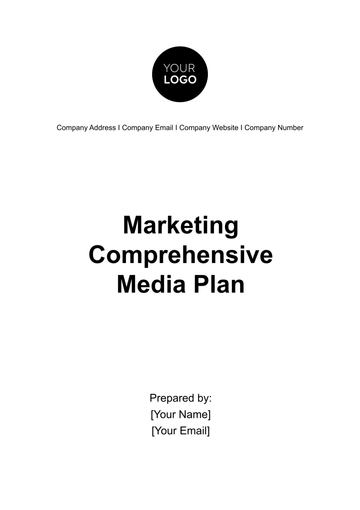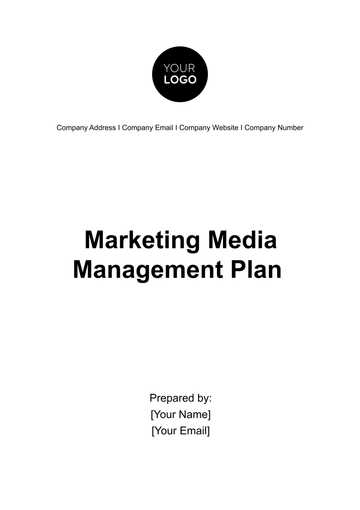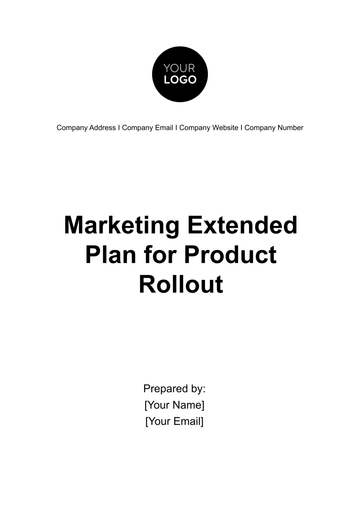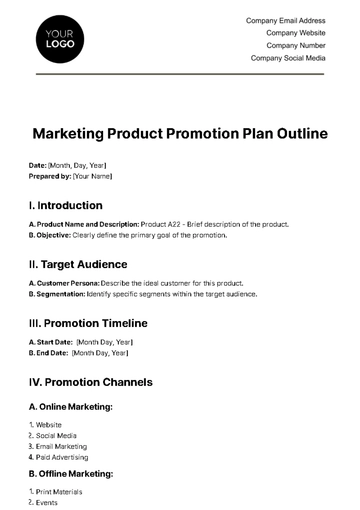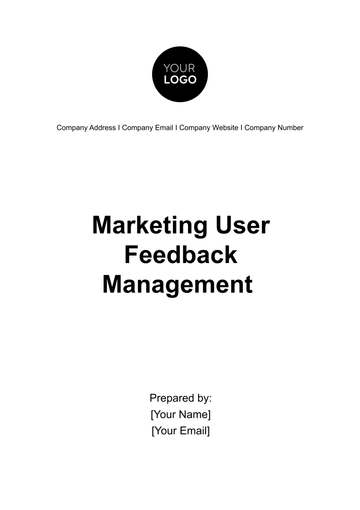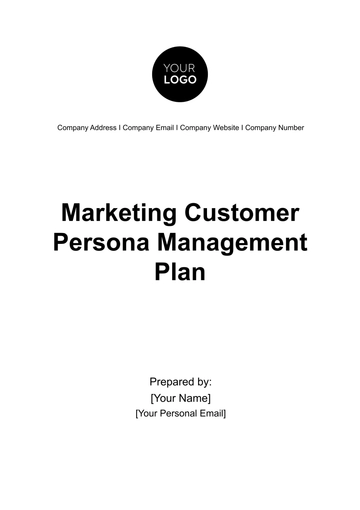Free Agriculture Online Marketing Strategy Plan
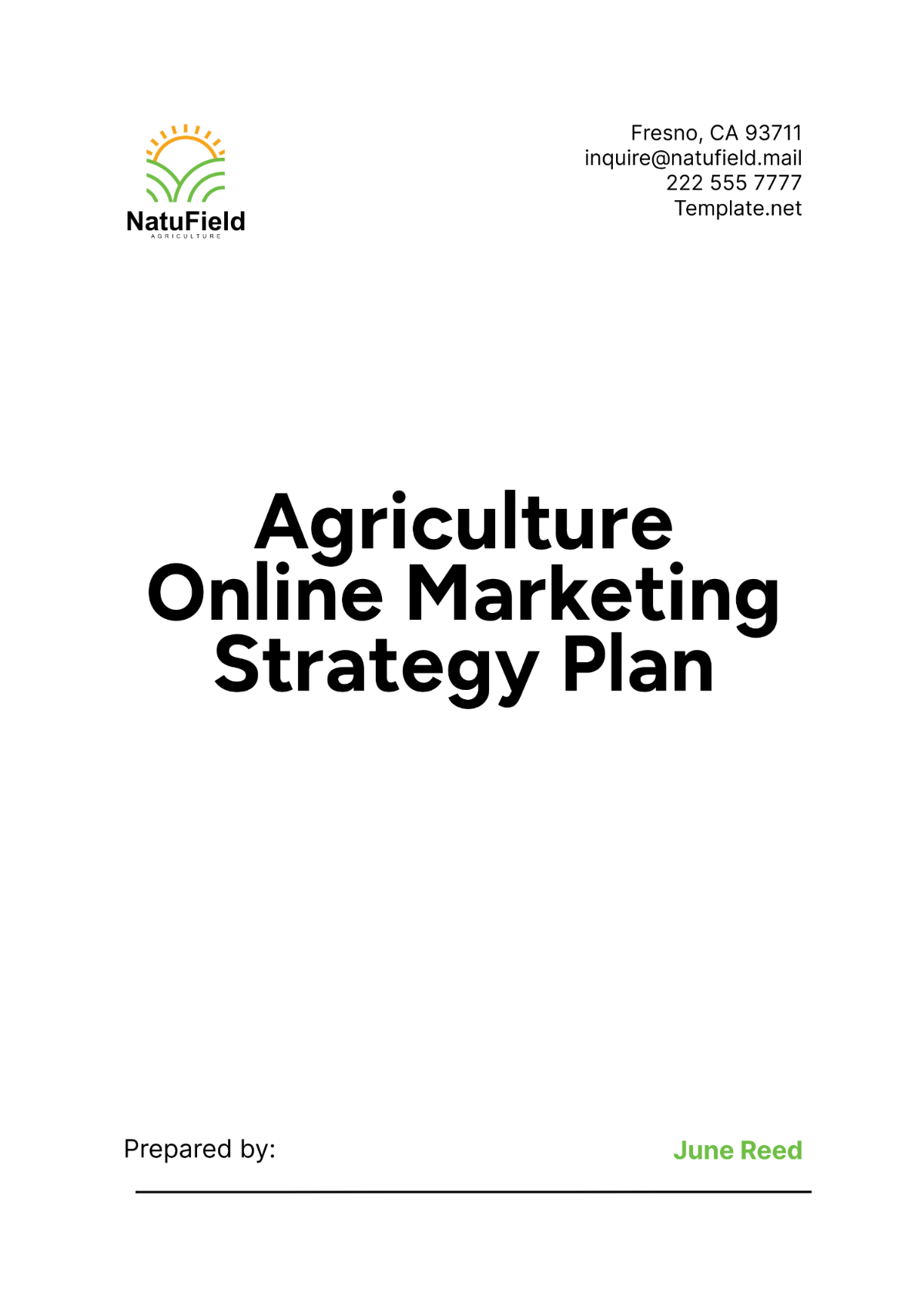
I. Introduction
In an increasingly digital world, [Your Company Name] recognizes the importance of establishing a robust online presence. Our objective is to leverage digital marketing strategies to enhance brand visibility, engage with our target audience, and ultimately drive sales. This plan outlines our approach to achieving these goals through a comprehensive online marketing strategy that includes website optimization, content marketing, social media engagement, and more.
II. Market Analysis
A. Industry Overview
The agriculture industry is undergoing a digital transformation, driven by advancements in technology and changing consumer behaviors. According to recent studies, the global digital agriculture market is expected to reach $10.23 billion by 2050, growing at a CAGR of 11.6%. Key trends include the increasing use of precision farming technologies, the rise of e-commerce platforms for agricultural products, and growing consumer demand for transparency and sustainability in food production.
B. Target Audience
Our target audience comprises various demographic groups with specific needs and behaviors. The following table provides a detailed overview:
Demographic | Age Range | Needs |
|---|---|---|
Small Farmers | 25-55 | Affordable technology, training |
Large Agribusinesses | 35-65 | Efficiency, scalability |
Consumers | 18-45 | Transparency, sustainability |
C. Competitor Analysis
Understanding our competitors' strengths and weaknesses helps us refine our strategy. The following table highlights key competitors in the market:
Competitor | Market Share | Strengths | Weaknesses |
|---|---|---|---|
25% | Strong brand | Limited social media | |
20% | Advanced technology | High pricing | |
15% | Robust e-commerce | Customer service |
III. SWOT Analysis
Our SWOT analysis identifies internal strengths and weaknesses, as well as external opportunities and threats. This helps us understand our position in the market and plan accordingly.
Strengths | Weaknesses |
|---|---|
Strong product portfolio | Limited online presence |
Expertise in sustainable farming | Small marketing team |
Loyal customer base | Outdated website design |
Opportunities | Threats |
|---|---|
Growing demand for organic produce | Intense competition |
Expansion into new markets | Regulatory changes |
Adoption of digital technologies | Fluctuating commodity prices |
IV. Marketing Objectives
To achieve our overall goals, we have set the following SMART objectives for our online marketing strategy:
Increase Website Traffic: Boost website visits by 25% within the next six months through SEO and content marketing efforts.
Generate Leads: Obtain 100 new leads per month via targeted email marketing campaigns and lead magnets.
Enhance Social Media Engagement: Grow our social media following by 50% in one year by implementing a robust content calendar and engagement strategies.
Improve Brand Awareness: Increase brand awareness by 30% in the next year through influencer partnerships and online advertising.
V. Target Audience Persona
Our ideal customer is a mid-sized farm owner aged between 35 and 55 who is keen on adopting new technologies to improve farm efficiency and productivity. They value sustainability and are actively seeking solutions that can help them reduce environmental impact while maximizing yield. This customer is tech-savvy, regularly engages with agricultural content online, and participates in industry forums and webinars to stay updated with the latest trends and innovations. They prefer personalized communication and value brands that offer excellent customer service and practical solutions tailored to their specific farming challenges.
VI. Online Marketing Channels and Tactics
A. Website Optimization
Our website is the cornerstone of our online presence. We will focus on improving user experience by enhancing site navigation, ensuring mobile responsiveness, and optimizing page load times. Implementing SEO best practices, such as keyword optimization, meta tag enhancements, and creating high-quality content, will help us rank higher in search engine results. Additionally, integrating clear calls to action (CTAs) and user-friendly contact forms will facilitate lead generation and customer engagement.
B. Content Marketing
Content marketing will play a pivotal role in establishing our brand as an authority in the agriculture industry. We will produce diverse content types, including blog posts, whitepapers, case studies, and infographics. A key tactic will be developing seasonal and evergreen content to address current trends and long-term agricultural challenges. By maintaining a content calendar, we can ensure consistent publication and align our content with our audience's interests and needs.
C. Social Media Marketing
Social media platforms provide an excellent opportunity to connect with our audience and build community engagement. We will focus on platforms such as Facebook, Instagram, and LinkedIn, tailoring content to each platform's unique audience. Strategies will include regular posting of educational content, behind-the-scenes looks at our operations, customer testimonials, and interactive posts like polls and Q&A sessions. Paid social media campaigns will further amplify our reach and engagement.
D. Email Marketing
Email marketing will help us nurture leads and maintain relationships with our customers. We will implement list-building strategies, such as offering downloadable resources and exclusive content. Segmented email campaigns will allow us to deliver personalized content based on subscriber preferences and behavior. Automation tools will streamline our efforts, enabling timely follow-ups and engagement with our audience.
E. Paid Advertising
Paid advertising will complement our organic efforts and drive targeted traffic to our website. We will utilize pay-per-click (PPC) campaigns on Google Ads to capture high-intent search traffic. Social media ads on platforms like Facebook and Instagram will target specific demographics and interests. Retargeting strategies will help us re-engage visitors who have previously interacted with our website but did not convert.
F. Influencer and Partnership Marketing
Partnering with influencers and industry leaders will enhance our credibility and expand our reach. We will identify key influencers within the agriculture sector and collaborate on content creation and promotion. Strategic partnerships with complementary businesses and organizations will also provide mutual benefits, such as co-hosting webinars, joint marketing campaigns, and cross-promotional opportunities.
VII. Content Strategy
Our content strategy will be driven by a well-structured content calendar that ensures consistent and relevant content delivery. We will focus on various content types to engage our audience and establish thought leadership.
Week | Content Type | Topic | Platform |
|---|---|---|---|
1 | Blog Post | Sustainable Farming Practices | Website, LinkedIn |
2 | Infographic | Benefits of Precision Farming | Facebook, Instagram |
3 | Case Study | Success Story: Small Farm | Website |
4 | Webinar | Latest Trends in Agriculture | Zoom, YouTube |
5 | Video | Behind the Scenes of Our Farm | Instagram, Facebook |
6 | Whitepaper | Technology in Agriculture | Website, Email |
VIII. Analytics and Reporting
Analytics and reporting are crucial for measuring the success of our online marketing efforts. We will track key performance indicators (KPIs) to evaluate our progress and optimize our strategies.
Metric | Target Value |
|---|---|
Website Traffic | 25% increase in 6 months |
Leads Generated | 100 new leads per month |
Social Media Followers | 50% growth in one year |
Email Open Rate | 20% |
PPC Conversion Rate | 5% |
Regular reporting will occur on a monthly and quarterly basis. We will use tools such as Google Analytics, social media insights, and email marketing software to gather data. Reports will be reviewed by our marketing team to identify trends, assess performance against targets, and adjust tactics as needed.
IX. Budget and Resources
Effective budget allocation and resource management are essential for the successful implementation of our online marketing strategy.
Budget Allocation
Category | Budget Allocation |
|---|---|
Website Optimization | $5,000 |
Content Marketing | $3,000 |
Social Media Marketing | $2,500 |
Email Marketing | $1,500 |
Paid Advertising | $4,000 |
Influencer Partnerships | $2,000 |
Total | $18,000 |
Resource Allocation
Resource | Allocation |
|---|---|
Marketing Team | 3 members |
Content Creators | 2 members |
Social Media Managers | 1 member |
SEO Specialists | 1 member |
Email Marketing Tools | Mailchimp, $500 annually |
Analytics Tools | Google Analytics, free |
X. Implementation Plan
Our implementation plan outlines the milestones, timeline, and roles necessary for the successful execution of our online marketing strategy.
Milestone | Timeline | Responsibility |
|---|---|---|
Website Redesign Completion | ||
Content Calendar Development | ||
Social Media Strategy Launch | ||
First Email Campaign Launch | ||
PPC Campaign Initiation | ||
Influencer Partnership Kickoff | ||
Quarterly Review and Adjustment |
- 100% Customizable, free editor
- Access 1 Million+ Templates, photo’s & graphics
- Download or share as a template
- Click and replace photos, graphics, text, backgrounds
- Resize, crop, AI write & more
- Access advanced editor
Introducing Template.net's Agriculture Online Marketing Strategy Plan Template, fully editable and customizable in our AI Editor tool. Develop effective digital marketing strategies tailored for the agricultural sector. Perfect for boosting online presence and reaching target audiences efficiently.
You may also like
- Finance Plan
- Construction Plan
- Sales Plan
- Development Plan
- Career Plan
- Budget Plan
- HR Plan
- Education Plan
- Transition Plan
- Work Plan
- Training Plan
- Communication Plan
- Operation Plan
- Health And Safety Plan
- Strategy Plan
- Professional Development Plan
- Advertising Plan
- Risk Management Plan
- Restaurant Plan
- School Plan
- Nursing Home Patient Care Plan
- Nursing Care Plan
- Plan Event
- Startup Plan
- Social Media Plan
- Staffing Plan
- Annual Plan
- Content Plan
- Payment Plan
- Implementation Plan
- Hotel Plan
- Workout Plan
- Accounting Plan
- Campaign Plan
- Essay Plan
- 30 60 90 Day Plan
- Research Plan
- Recruitment Plan
- 90 Day Plan
- Quarterly Plan
- Emergency Plan
- 5 Year Plan
- Gym Plan
- Personal Plan
- IT and Software Plan
- Treatment Plan
- Real Estate Plan
- Law Firm Plan
- Healthcare Plan
- Improvement Plan
- Media Plan
- 5 Year Business Plan
- Learning Plan
- Marketing Campaign Plan
- Travel Agency Plan
- Cleaning Services Plan
- Interior Design Plan
- Performance Plan
- PR Plan
- Birth Plan
- Life Plan
- SEO Plan
- Disaster Recovery Plan
- Continuity Plan
- Launch Plan
- Legal Plan
- Behavior Plan
- Performance Improvement Plan
- Salon Plan
- Security Plan
- Security Management Plan
- Employee Development Plan
- Quality Plan
- Service Improvement Plan
- Growth Plan
- Incident Response Plan
- Basketball Plan
- Emergency Action Plan
- Product Launch Plan
- Spa Plan
- Employee Training Plan
- Data Analysis Plan
- Employee Action Plan
- Territory Plan
- Audit Plan
- Classroom Plan
- Activity Plan
- Parenting Plan
- Care Plan
- Project Execution Plan
- Exercise Plan
- Internship Plan
- Software Development Plan
- Continuous Improvement Plan
- Leave Plan
- 90 Day Sales Plan
- Advertising Agency Plan
- Employee Transition Plan
- Smart Action Plan
- Workplace Safety Plan
- Behavior Change Plan
- Contingency Plan
- Continuity of Operations Plan
- Health Plan
- Quality Control Plan
- Self Plan
- Sports Development Plan
- Change Management Plan
- Ecommerce Plan
- Personal Financial Plan
- Process Improvement Plan
- 30-60-90 Day Sales Plan
- Crisis Management Plan
- Engagement Plan
- Execution Plan
- Pandemic Plan
- Quality Assurance Plan
- Service Continuity Plan
- Agile Project Plan
- Fundraising Plan
- Job Transition Plan
- Asset Maintenance Plan
- Maintenance Plan
- Software Test Plan
- Staff Training and Development Plan
- 3 Year Plan
- Brand Activation Plan
- Release Plan
- Resource Plan
- Risk Mitigation Plan
- Teacher Plan
- 30 60 90 Day Plan for New Manager
- Food Safety Plan
- Food Truck Plan
- Hiring Plan
- Quality Management Plan
- Wellness Plan
- Behavior Intervention Plan
- Bonus Plan
- Investment Plan
- Maternity Leave Plan
- Pandemic Response Plan
- Succession Planning
- Coaching Plan
- Configuration Management Plan
- Remote Work Plan
- Self Care Plan
- Teaching Plan
- 100-Day Plan
- HACCP Plan
- Student Plan
- Sustainability Plan
- 30 60 90 Day Plan for Interview
- Access Plan
- Site Specific Safety Plan
